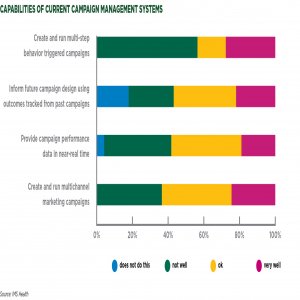Setting the Global Benchmark for Mexican Biotechnology

STORY INLINE POST
Q: After heading up Amgen Mexico, what prompted your move to local giant PROBIOMED?
A: I made this move for a number of reasons: the challenge it represented, the prestige of PROBIOMED, and my desire to build a legacy by projecting a Mexican company that cares for health and patients. The founder of PROBIOMED, Jaime Uribe de la Mora, recognized the need for evolution to propel the company forward, and this will be part of his legacy. De la Mora started selling APIs 45 years ago and moved on to selling generics and ultimately biosimilar products. He has reinvented the company and adapted to numerous market changes. Today, PROBIOMED is the only company in Mexico that produces biotechnology products from the gene to the finished product, relying on four manufacturing plants and employing 1,300 collaborators.
Q: What are the essential elements needed to progress the company from a local family company to an institutionalized global player?
A: First and foremost, we need to get the right corporate governance and structure in place. It is vital to implement strategy, structure, and objectives in order to align accountability and communication throughout the company. Furthermore, by continuing to ensure ROI and by launching innovation and excellence strategies, we can ensure that the company is capable of surpassing the competition. Timing is also a key factor for success. Being the pioneer in this field, and having launched 16 biotechnology products in the last 17 years, PROBIOMED has a competitive edge. The company is very proud of what we have accomplished in 45 years. Competing with big pharmaceutical companies is no easy feat and we are now an industry leader that poses a threat to most incumbents. With increased focus on patient needs, we plan to continue expanding as a global innovator.
Q: What role should biotechnology products play in treating chronic and degenerative diseases?
A: The market dynamics in Mexico are mainly driven by a demographic and epidemiologic transition that in turn is putting pressure on everybody’s budget. The biggest business opportunity in the biopharmaceutical industry is now manufacturing and commercializing biosimilars. Looking at the size of the market and the number of patents expiring, the coexistence of innovative products with biosimilars is crucial for healthcare systems to be able to meet future patient demand from a treatment perspective. In this way, savings that arise from the use of biosimilars can be further invested in innovative drugs. I expect the government will be forced to implement such strategies in the medium term.
Q: How can Mexico become more innovative and therefore more competitive?
A: This industry can be a real engine of innovation but is in dire need of an industrial development policy. Mexico has the highest and second highest levels of childhood and adult obesity respectively worldwide. Obesity causes cardiovascular diseases and diabetes, which means 70- 80% of patients will end up in dialysis and the system will run the risk of collapsing. Biopharmaceuticals are mainly used for chronic and degenerative diseases as they are more effective and are better suited to our physiology than chemically synthesized molecules. However, this does not exempt all players to from continuing to work on on prevention strategies.
Q: Where is PROBIOMED aiming to position itself in terms of value proposition in this highly competitive industry?
A: Today, PROBIOMED is the only company in Mexico that is able to manufacture high-quality products at a low cost. We develop from the gene’s inception to the final medication, whereas most pharmaceutical companies import finished products and very few import APIs to manufacture final products. In contrast to traditional generics, the manufacturing of biosimilars requires significant innovative processes, such as the genetic engineering of living organisms, and the use of bioreactors for the production of proteins and antibodies. It is essential to promote local manufacturing so that Mexico does not become reliant on importation. PROBIOMED is also the only company in the world that has a complete portfolio of medication for unmet medical needs such as cancer, rheumatoid arthritis, end stage renal disease, multiple sclerosis, and diabetes.
Q: Is enough being done to push forward the development of the biopharmaceutical industry in Mexico?
A: Mexico has made impressive progress from a regulatory standpoint in a very short time. With the new benchmark NOM 257 regulations, innovative biopharmaceuticals and biosimilars will be able to coexist in the Mexican healthcare system, protecting patients’ safety and efficacy. Before the regulatory framework for biosimilars was developed, safety requirements were not as strict as they are now. The new norm requires characterization and biocomparability studies as well as safety and efficacy trials that demonstrate their high similarity to the reference products. PROBIOMED fully believes in this approach but the country is still not fully ready for this in terms of infrastructure. If a full characterization study is required, no local supplier can do this in Mexico. The Mexican industry needs more investment and support that will allow companies to meet regulatory requirements and ensure quality standards.
Q: Is PROBIOMED planning to perform the mandatory studies abroad in order to gain registration renewals?
A: We want to ensure we fully comply with the new regulation as it impacts PROBIOMED at all levels of its process. For approval in Mexico, clinical trials can be done locally, but some tests will have to be outsourced internationally, such as physicochemical characterization. COFEPRIS will evaluate this on a case-by-case basis and publish a set of requirements for a specific product, according to previous studies and available information. There are approved third-party organizations for bioequivalence studies but that is not the case for biocomparability.
Q: What is your perception of the withdrawal of Rituximab from the market and how does this impact patients?
A: PROBIOMED’s Rituximab was not withdrawn from the market due to a lack of quality or efficacy. It was due to a legal situation in which the Supreme Court of Justice entitled COFEPRIS to determine whether biosimilars approved under previous regulation should stay on the market, given the allegations of the innovator company. Since there was no regulation for biosimilars at the time Rituximab was registered, COFEPRIS decided to revoke its registration until new regulations were in place. IMSS, the biggest consumer of this drug in Mexico was spending MX$1 billion on the innovative product on an annual basis. When Rituximab entered the market, expenses went down to MX$200 million with double the number of patients being treated. We are working closely with COFEPRIS to meet every single requirement, which represents a colossal investment of time, money, and resources. As for the other 65 biosimilar products that were previously registered as per the generics regulation, they will not be withdrawn from the market. However, we are undergoing a process of renovation where every company will have to submit more data to support their registration as per NOM 257. COFEPRIS has therefore granted a specific timeframe to allow companies to conduct the necessary studies to gain approvals as biocomparables.
Q: How important are exports to your growth strategy and what obstacles stand in the way?
A: With the international recognition of COFEPRIS, it will be easier for Mexican companies to penetrate markets in Latin America. Our value proposition is being able to provide high-quality products at low costs, which is exactly what governments and patients are looking for. We are currently exporting to 14 countries across four continents and we will expand this to countries with a real demand for our products. Unlike in Mexico, countries like Brazil, South Korea, India, Malaysia, and Russia incentivize the manufacturing of biotechnology. Since manufacturing plants require huge investments, we are still deciding which country would provide the best location. Strong incentives include ten-year tax exemptions, a guaranteed percentage of government contracts, and a price incentive in exchange for technology transfer through a local partner. Some countries will even match 30-50% of the initial investment as long as the company invests in the country.
Q: What does the foreseeable future look like for the biotechnology sector in Mexico?
A: We are working with universities and research centers in Mexico and other countries such as Brazil, Germany, and Russia. We have 1,300 employees in Mexico and a lot of them are highly qualified investigators. Today, the biotechnology industry is growing at around 25% a year and will maintain a double-digit pace for the foreseeable future. Interestingly, local companies are growing the most while the share of multinational companies is actually decreasing in Mexico due to the expiration of patents and the rise of generics. Furthermore, while Mexico is lagging behind the US and Europe in terms of development, technological advances will disrupt the whole industry’s dynamics in the medium term. As for genomics, it will take another two or three decades for them to truly have an impact on patients and the wider industry. Targeted medicines are central to the genomics revolution and specific drugs are starting to be developed and prescribed for certain types of cancer, replacing the standard chemotherapy treatment. This is the promise of personalized medicine, but a lot of research is still needed. Unfortunately, the timeframe from discovery to development is becoming longer as diseases are found to be more complex than previously expected, significantly increasing the required investment.























